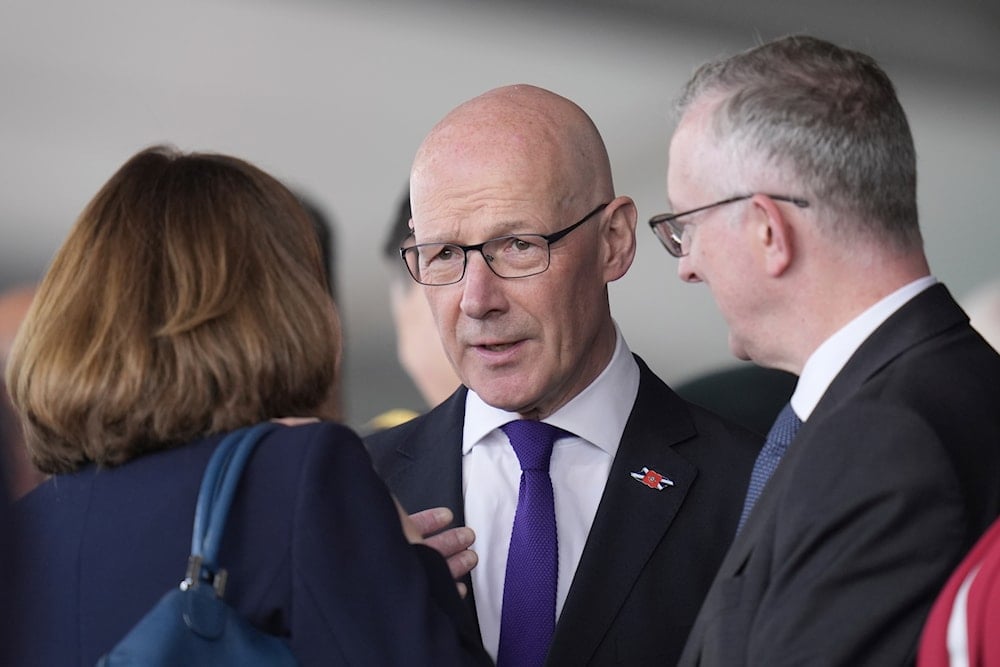Scottish government considering boycott of 'Israel' for genocide
The Scottish Government is considering a boycott of "Israel" after MP Ross Greer urged action over the Gaza genocide and called for BDS measures.
-

First Minister of Scotland John Swinney attends a commemorative event for the 80th anniversary of D-Day, in Portsmouth, England, on June 5, 2024. (Andrew Matthews/Pool via AP)
The Scottish government is considering a formal boycott of "Israel" following a proposal by Scottish Greens co-leader Ross Greer, who has urged First Minister John Swinney to adopt the principles of the Boycott, Divestment and Sanctions (BDS) campaign, The National revealed on Thursday.
The BDS campaign, which mirrors the international boycott of apartheid South Africa, seeks to pressure “Israel” over its actions in the occupied Palestinian territories. Greer’s call follows the First Minister’s public acknowledgement that "there is a genocide in Palestine."
In a letter to Swinney, Greer wrote: "As we both know and have previously discussed, there is much more that the Scottish Government can be doing to put pressure on Israel to end its genocide in Palestine." He rejected the First Minister’s claim that the Scottish Government is already doing "everything I possibly can do to make sure that we apply the pressure."
According to The National report, among the measures outlined by Greer are proposals to amend existing legislation to allow local councils to bar companies involved in the occupation of Palestinian land from receiving public contracts. Specifically, Greer called for changes to the Local Government Act 1988 through the Community Wealth Building Bill.
He also called on the Scottish government to:
- Issue guidance to businesses advising them to end trade with "Israel," as was done in 2022 with Russia
- Halt public funding of arms manufacturers supplying "Israel"
- Impose financial penalties on "complicit companies" through non-domestic rates surcharges
- Encourage pension fund divestment from firms "complicit in Israel’s apartheid regime"
Greer added, "Most foreign policy powers lie with Westminster, but there are still meaningful actions the Scottish Government could take, yet hasn’t."
"Scotland has a moral responsibility to act. The same approach helped end apartheid in South Africa. Now we must show that solidarity with the people of Palestine."
Scottish government response and political implications
A Scottish Government spokesperson confirmed the proposal is under review: "Ministers will consider and reply to Mr. Greer’s letter."
While the Scottish Government does not control UK foreign policy, Greer and other pro-Palestine campaigners argue that Scotland still has economic and moral tools at its disposal to oppose "Israel’s campaign of ethnic cleansing."
The United Nations has previously identified several companies as complicit in activities related to "Israel’s" occupation of Palestinian land. Greer’s proposals seek to align Scottish policy with these international findings.
The move to consider a state-level boycott of "Israel" marks a significant escalation in Scotland’s political stance on the Gaza genocide and may widen the divide between Holyrood and Westminster on foreign affairs.
Trump's Scotland visit met with protests
Late last month, Trump's private five-day visit to Scotland sparked widespread outrage across the country, with demonstrators taking to the streets in Edinburgh and Aberdeen to protest both his political record and the nature of his visit.
According to STV, hundreds rallied on July 26, denouncing Trump's return to the international stage. Protesters in Aberdeen carried placards reading "No to Trump" and "Stop Trump," while many waved Palestinian flags in solidarity with Gaza.
Though framed as a personal trip, Trump's itinerary included high-level meetings with UK Prime Minister Keir Starmer and European Commission President Ursula von der Leyen.

 3 Min Read
3 Min Read










